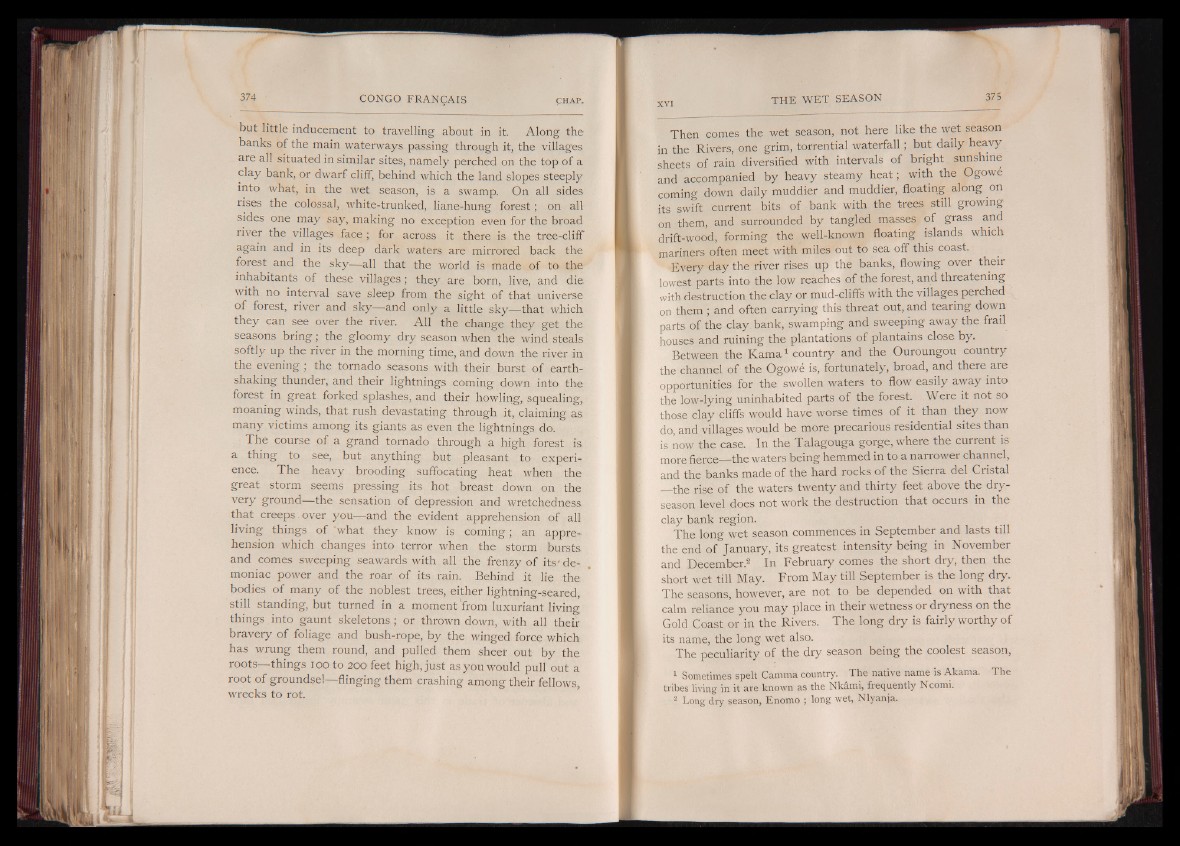
but little inducement to travelling about in it. Along the
banks of the main waterways passing through it, the villages
are all situated in similar sites, namely perched on the top of a
clay bank, or dwarf cliff, behind which the land slopes steeply
into what, in the wet season, is a swamp. On all sides
rises the colossal, white-trunked, liane-hung forest; on all
sides one may say, making no exception even for the broad
river the villages face; for across it there is the tree-cliff
again and in its deep dark waters are mirrored back the
forest and the sky— all that the world is made of to the
inhabitants of these villages; they are born, live, and die
with no interval save sleep from the sight of that universe
of forest, river and sky— and only a little sky&that which
they can see over the river. All the change they get the
seasons bring; the gloomy dry season when the wind steals
softly up the river in the morning time, and down the river in
the evening; the tornado seasons with their burst of earth-
shaking thunder, and their lightnings coming down into the
forest in great forked splashes, and their howling, squealing,
moaning winds, that rush devastating through it, claiming as
many victims among its giants as even the lightnings do.
The course of a grand tornado through a high forest is
a thing to see, but anything but pleasant to experience.
The heavy brooding suffocating heat when the
great storm seems pressing its hot breast down on the
very ground— the sensation of depression and wretchedness
that creeps over you— and the evident apprehension of all
living things of ‘what they know is coming; an apprehension
which changes into terror when the storm bursts
and comes sweeping seawards with all the frenzy of its'demoniac
power and the roar of its rain. Behind it. lie the
bodies of many of the noblest trees, either lightning-seared,
still standing, but turned in a moment 'from luxuriant living
things into gaunt skeletons; or thrown down, with all their
bravery of foliage and bush-rope, by the winged force which
has wrung them round, and pulled them sheer out by the
roots— things 100 to 200 feet high, just as you would pull out a
root of groundsel— flinging them crashing among their fellows,
wrecks to rot.
Then comes the wet season, not here like the wet season
in the Rivers, one grim, torrential waterfall; but daily hea.vy
sheets of rain diversified with intervals of bright sunshine
and accompanied by heavy steamy heat; with the Ogowe
coming down daily muddier and muddier, floating along on
its swift current bits of bank with the trees still growing
on them, and surrounded by tangled masses of grass and
drift-wood, forming the well-known floating islands which
mariners often meet with miles out to sea off this coast.
Every day the river rises up the banks, flowing over their
lowest parts into the low reaches of the forest, and threatening
with destruction the clay or mud-cliffs with the villages perched
on them ; and often carrying this threat out, and tearing down
parts of the clay bank, swamping and sweeping away the frail
houses and ruining the plantations of plantains close by.
Between the Kama1 country and the Ouroungou country
the channel of the Ogowe is, fortunately, broad, and there are
opportunities for the swollen waters to flow easily away into
the low-lying uninhabited parts of the forest. Were it not so
those clay cliffs would have worse times of it than they now
do, and villages would be more precarious residential sites than
is now the case. In the Talagouga gorge, where the current is
more fierce— the waters being hemmed in to a narrower channel,
and the banks made of the hard rocks of the Sierra del Cristal
||the rise of the waters twenty and thirty feet above the dry-
season level does not work the destruction that occurs in the
clay bank region.
The long wet season commences in September and lasts till
the end of January, its greatest intensity being in November
and December.2 In February comes the short dry, then the
short wet till May. From May till September is the long dry.
The seasons, however, are not to be depended on with that
calm reliance you may place in their wetness or dryness on the
Gold Coast or in the Rivers. The long dry is fairly worthy of
its name, the long wet also.
The peculiarity of the dry season being the coolest season,
1 Sometimes spelt Camma country. The native name is Akama. The
tribes living in it are known as the Nkami, frequently Ncomi.
2 Long dry season, Enomo ; long wet, Nlyanja.